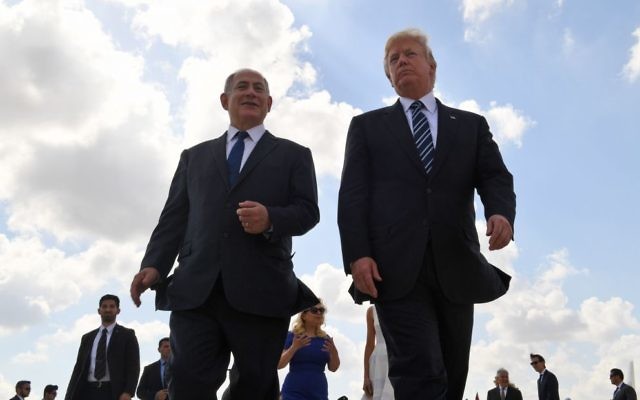Music to Bibi’s ears
DONALD Trump left Israel on Tuesday after a whirlwind trip in which he made history as the first sitting US President to visit the Kotel – and appearing optimistic that he can go down in history as the man who will make peace.

DONALD Trump left Israel on Tuesday after a whirlwind trip in which he made history as the first sitting US President to visit the Kotel – and appearing optimistic that he can go down in history as the man who will make peace.
He didn’t just come with the normal American claim that the White House can bring Israel and the Palestinians together but brimming with confidence that he can bring parts of the Arab world on board.
Speaking with unprecedented certainty, he said, “I was deeply encouraged by my conversations with Muslim world leaders in Saudi Arabia, including King Salman, who I spoke to at great length. King Salman feels very strongly, and I can tell you would love to see peace between Israel and the Palestinians.”
This was music to the ears of Benjamin Netanyahu, Prime Minister of Israel, who has long been saying that his country is building connections with some Arab states and who strongly believes that any deal would need a regional element, to talk seriously about peace. “For the first time in my lifetime, I see a real hope for change,” Netanyahu told Trump. “The Arab leaders who you met yesterday could help change the atmosphere, and they could help create the conditions for a realistic peace.”
The Israeli PM talked about peace several times alongside Trump. “We’ve already made peace with Egypt and with Jordan,” he said. “And Israel’s hand is extended in peace to all our neighbours, including the Palestinians.”
Aside from the Saudi comments, there was another element of Trump’s peace talk that is said to have pleased Netanyahu. When the US leader met his Palestinian counterpart, Mahmoud Abbas, he spoke about being committed to peace in general terms, but didn’t use the phrase “two-state solution” – the code-word for a peace deal that would involve a Palestinian state. Many on the Israeli right want other options for the future of Israeli–Palestinian relations considered as well as the two-state possibility.
One of the most welcome Trump declarations for Israel was the blunt assessment of the West’s nuclear deal with Iran which was negotiated by Trump’s predecessor Barack Obama – and the assurance that went along with this. “Instead of saying thank you to the United States, they now feel emboldened,” Trump said of the Iranians, saying that the decision to enter the deal was a “terrible thing for the United States”. He said: “Believe me, Iran will never have a nuclear weapon, that I can tell you.”
Trump discussed Iran in the context of terrorists. “Israelis have experienced firsthand the hatred and terror of radical violence,” Trump said during a speech on Tuesday. “Israelis are murdered by terrorists wielding knives and bombs. Hamas and Hezbollah launch rockets into Israeli communities where schoolchildren have to be trained to hear the sirens and run to the bomb shelters – with fear, but with speed. ISIS targets Jewish neighbourhoods, synagogues, and store-fronts. And Iran’s leaders routinely call for Israel’s destruction.” The President then declared, to enthusiastic applause: “Not with Donald J. Trump, believe me.”
Trump says that worries about Iran can help to bring together the US, Arab states and Israel – against Tehran and eventually to progress peace. His Iran comments went down well with Israelis, but didn’t answer all the points they raised.
Israeli President Reuven Rivlin spoke to Trump not only about fears of a nuclear Iran, but also about his worries over growing Iranian power in Syria, which is on Israel’s border and, through its influence of Hezbollah, in Lebanon. “In order to dream, we need to be sure that Iran is out; out of our borders, out of Syria, out of Lebanon,” Rivlin said – but Trump’s reassurances did not extend to dealing with the Iranian threat there.
On the omission of the “two-state” phrase by Trump, Netanyahu – who has committed himself to a two-state formula but lacks enthusiasm for it – didn’t comment, but others on the Israeli right expressed joy. Oded Revivi, foreign envoy of the main settler umbrella group the Yesha Council commented to The AJN: “President Trump didn’t mention two states at all. We hope this is an indication that he has left behind that failed policy and look forward to building a true and lasting peace from the ground up.”
On the other side of the Israeli political map, Anat Ben-Nun, spokeswoman for Peace Now, told The AJN that she thinks the right-wing is getting ahead of itself. “Both President Trump and the parties to which he referred as partners to peace, know there is only one solution to the conflict, which is the two-state solution,” she said. “While President Trump chose to speak in general terms, actions he has taken thus far are in line with the two-state formula.”
For full coverage of Trump’s trip to Israel, see this week’s AJN.
NATHAN JEFFAY

comments